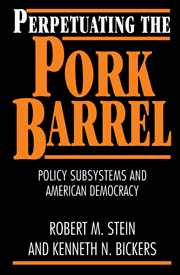3 - The geographic scope of domestic spending: A test of the universalism thesis
Published online by Cambridge University Press: 05 June 2012
Summary
In Chapter 2, we showed that the growth in the number of distributive programs coincided with a decline in their average size. These programs were evidently attractive despite the absence of additional funding. Indeed, we argued that the attractiveness of the programs is independent of their size. A widely held thesis in the political science literature offers a possible reason for why this might be the case: the tendency for legislators to form oversized coalitions that bestow distributive projects on virtually every district represented in the legislature. The budgetary size of the projects is typically considered to be irrelevant to their desirability.
This thesis, in brief, is as follows. Formal models of legislative voting behavior have shown that legislators, when considering programs that involve geographically concentrated benefits and diffuse costs, have an incentive to form legislative coalitions far larger than simple majorities. This tendency was first characterized by Mayhew (1974) as universalism, which, he suggests, serves the desire of legislators to win reelection. Weingast (1979), Shepsle and Weingast (1981), and Weingast, Shepsle, and Johnsen (1981) identify uncertainty as to whether a legislator will be included in the final winning coalition, and thus will obtain valuable assistance in his or her reelection bid, as the primary impetus driving universalism. They argue that by ensuring every district receives some amount of federal spending, supporters of spending programs eliminate the uncertainty about the inclusion of each member of the legislature in the winning coalition.
- Type
- Chapter
- Information
- Perpetuating the Pork BarrelPolicy Subsystems and American Democracy, pp. 30 - 44Publisher: Cambridge University PressPrint publication year: 1995

